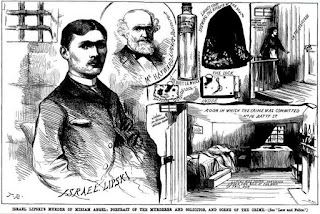“Lipski”- Can We Be Certain of Anything When it Comes to the Jack the Ripper Case?
Those
of you have read my posts on Ripper suspects know that I tend to harp on
certain things concerning the case to the point of being obnoxious about it. You
also probably know that I tend to be long winded on the questions of this case.
I’m about to do both things yet again. Please feel free to just skip by this
post if you’re not in the mood to put up with my ponderings.
One
of those things I have harped on often, and intend to do so again, is to remind
everyone, including myself, that, since we do not know for certain who the
killer actually was, since even the experts cannot agree on which murders were
actually Ripper killings, we have to remember when discussing the case that we
actually cannot be certain of very much.
Part
of this is due to how much time has passed. Any experienced police detective
will tell you that the more time that passes after the actual events of a
crime, the more damaged and murky the evidence can become.
Part
of this is due to how limited the actual investigation was, by the fact that
this type of killing was virtually unknown by the public and the authorities,
though it seems safe to say that this type of killing certainly took place long
before this, by the general chaos of Whitechapel’s overpopulation and the
transient nature of so much of that population, and by the general incompetence
and bureaucratic meddling of those involved in the investigation, one of the
other considerations I am forever harping about.
Look,
I do not carry on about this because I have something against the police
themselves. I say this because even the police apologists find themselves
acknowledging that the very idea of Detecting crime was still a relatively knew
one and investigative practices at the time were still lacking in many of the
common practices of modern day detectives. Put aside how limited forensic
investigation was at the time. Onlookers were allowed to trample through
evidence. Reporters and citizens were able to actively interfere with the
investigation. And police training on and about investigative techniques was
virtually non existent. The men in charge of the investigation were not trained
police officers. They were political appointees. Usually military men whose
prime job it was to maintain the peace, often in brutal fashion. And add to
that this simple thought: Are the majority of the people in any job you choose
to think about particularly competent at their jobs? Why should the police be
any different? Even given modern techniques and knowledge you don’t have to
look far today to see signs of bad policework. Not because the police are worse
than the rest of us. But because they’re no different than the rest of us. They’re
human beings. And, like their fellow human beings, most of them are just doing
enough to keep their jobs. Just like other human beings, exceptional is
exceptional because it is not ordinary or common practice.
So,
given all of this, we put ourselves in real danger of being led further from
the truth when we allow ourselves to assume that we Know things that we simply
do not know.
Take
the way that the name and/or word ‘Lipski’ has become so fixed in its
interpretation and acceptance as part of this case.
We
know that Israel Schwartz testified that he heard a Broad Shouldered man, in
the midst of physical confrontation with apparent prostitute shortly before
Elizabeth Stride’s body being found, call out ‘Lipski’, apparently to a taller
man in the midst of lighting a pipe, and that Schwartz believed that the Pipe
Smoking man then pursued him, Schwartz, as he fled the scene.
We
know that Frederick Abberline said that this was a common insult hurled at
Jewish people in the East End as a result of the highly publicized trial of a Jewish
man named Israel Lipski for the murder of a pregnant woman.
Everything
about ‘Lipski’ associated with the Ripper murders beyond those two things is
nothing more than opinion, and both of those are nothing more than the opinion
of two men associated with the case.
Remember
that Schwartz spoke little or no English, being a visitor from Hungary, and
that he was, by his own testimony in fear for his life. This was, after all,
one of the worst ghettos on the planet at the time and a visitor who did not
speak the language well, or at all, is not likely to be thinking, seeing or
hearing very clearly. It would have been very easy for Schwartz’ mind to have
imposed a word or name he understood over a similar sounding word or name that
he did not know. And if he did actually hear ‘Lipski’ it is not at all clear
what was meant or what Schwartz took it to mean. He himself is not on record as
being aware of the local usage of the name or that he took it in any way to be anti-Semitic.
He is also only opining that the Broad Shouldered Man called that word or name
out to the Pipe Smoking Man, and then that the Pipe Smoking Man then actually
pursued the terrified Schwartz.
We
also cannot be certain that Schwartz got the time right. Remember that watches
were not a common thing back then, particularly not in a place like
Whitechapel, and that accurate watches, or accurate clocks for that matter,
were simply not part of the fabric of that world. And a difference of five or
ten minutes in Stride’s case is the difference between having seen the killer
and just a separate disconnected scuffle. Even if Schwartz somehow got the time
exactly right in the haze of his fear, that leaves fifteen minutes or so
between that incident and the discovery of Stride’s body, Depending on how
close Diemschutz’ estimation was of his time.
Remember
too that many experts don’t even believe Stride to be one of the Ripper’s
victims. Schwartz himself only takes on importance as a witness through
speculation about the speculation of Swanson written alongside the speculation
of Anderson, two of those untrained police officials I was referring to earlier.
And, even that speculation about speculation about speculation, then requires
speculation that it is Schwartz who is being referred to as the Jewish witness
who refused to testify against another Jewish man, who we then speculate was or
was not Aaron Kosminski.
And,
if it was the name/word ‘Lipski’ that Schwartz heard, and it it was intended as
anti-Semitic, that would seem evidence that the Broad Shouldered Man that Schwartz
saw was not Jewish. So, who would it be that Schwartz, if it was Schwartz that
Anderson and Swanson were referring to, refused to testify against?
Many
knowledgeable people in fact have suggested that one of both of the men who Schwartz
saw, were in fact plain clothes policemen. If that were the case, and I’m not
saying that it is, could ‘Lipski’ have been a kind of code or shorthand that
police were using in the area? Ask any black or Muslim person in America if
police today are capable of racist behaviour and language. Can we be in any way
sure that a cop in Whitechapel at the time would not use a racist phrase?
There
are also a number of people who make a strong argument that the Broad
Shouldered Man was in fact Morris Eagle(Siegel), the speaker and chair of the
event at the Working Men’s Educational Club, who was returning on or about
12:35 from walking a young woman home. It is not outside the realm of
possibility that Eagle got into an argument and physical altercation with a
prostitute for lingering in the alley so close to his club and would not tell
the police this for fear it would incriminate him or lead to him being framed.
Remember that his talk was on why Jewish workers should be socialists, and that
the club was a home not just to socialists and communists, but to anarchists,
any one or combination of which would be very hostile to the local authorities,
for very good reason, given that militaristic people like Anderson were in
charge. And, with the press, police and public being very focused at that time
on the idea of a Jewish killer, Eagle would have more good reason not to tell
the police something like that.
So,
if it were Eagle, aka Siegel, who Schwartz saw accosting the woman, why would a
Jewish Socialist call out an anti-Semitic name or word?
Now
add to this that papers like The Pall Mall Gazette had been hell bent during
the Lipski trial to advocate for Lipski’s innocence, going so far as to claim
that the judge in the case had told Lipski’s lawyer shortly before Lipski’s
execution, that he did not believe Lipski to be guilty. While this in itself
was likely an early version of Fake News, it would also be in the mind of many
Londoners, particularly Jewish Londoners, that Lipski was wrongly executed.
True
or not, this adds yet another wrinkle to an apparently simple piece of
evidence, in that the name might just as well to refer to a frame up by local
Jews as it might be an anti-Semitic phrase for non Jews.
I’m
not saying that is the case.
I’m
saying that even this iconic phrase, ‘Lipski’, so closely associated with the
Ripper murders, cannot be accepted with certainty of evidence of anything. Even
if the name/word was used, we can’t be sure about its actual significance. Yet
it is used so frequently as part of arguments for or against certain suspects
and theories.
And
this intricate web of questions and uncertainty surround virtually everything that
we call evidence in this case.
So,
should we stop speculating altogether?
No.
We
should speculate and we should debate because that is all that we have and almost
everything in this case is purely speculation.
That
doesn’t mean that we can’t arrive at some kind of truth.
It
doesn’t mean that ‘Lipski’ is not an important clue.
It
just means that we should be very careful to realize that any truth we arrive
at in the Ripper case is a purely personal truth.
We
may never know the actual truth.
And,
at least for me, that’s what makes this case so very worthy of our interest.
For
me that’s more than enough.
But,
then again, that too is just my opinion.
Maybe
we need to be more long winded and questioning about any aspect of this case if
we are to maintain some kind of balance and perspective.
Of
course, that is also a very convenient opinion for me.
And
we should remind ourselves that most of the things that we associate with this
case, like the name ‘Lipski’, becomes too easily a convenience that we paint as
a clue.
And
that, even what we decide that this ‘clue’ means, is also another layer of
convenience painted onto the picture that we hold of this case.
We
may be painting the truth.
But
that painting is far more an Impression than it is a photograph of this case.
And
that’s just my Impression of this particular case, and, of course, of ‘Lipski’.
#jacktheripper
#jacktherippersuspects #jacktheripperevidence #whitechapel #lipski
#julesdelorme #julesfdelorme #delormewriting #casebook #casebookjacktheripper
#whitechapelmurders




Comments
Post a Comment